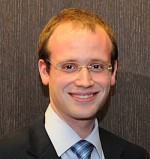Column Name
Title
Standing up and saying “I’m different” is never easy. Sometimes it’s downright terrifying. This is especially true when the difference is one of sexual orientation, a quality that is as deeply personal and immutable as it is vociferously debated both in court and in the court of public opinion. And it’s not as if coming out is something one does once. It’s a process that must be constantly repeated—to new friends and old acquaintances, to hotel clerks and apartment brokers—and truly, you never know what someone may say, or worse, what they might be thinking.
Body
While I’m not qualified to speak for all my colleagues, many of us who are making careers in the arts have come either from loving and supportive environments or at least have managed to escape hostile ones. But that’s simply not the case for everyone.
Last summer, my friend and colleague Joseph Arndt (M.M. ’09, organ) contacted me about an organization he had become affiliated with, the Hetrick-Martin Institute (H.M.I.). It’s the oldest and largest group devoted to the support and advocacy of at-risk L.G.B.T.Q. youth and also the host agency for New York City’s Harvey Milk High School. Joe explained that Hetrick-Martin was opening a satellite program in Newark and that the church where he serves as music director, Grace (Episcopal) Church in Newark, had elected to become H.M.I.’s first faith-based partner. Joe was now serving on the advisory board for the Newark H.M.I. and wanted to get me to join him in curating some sort of musical benefit for them.
He gave me some background. Prior to H.M.I., Newark’s L.G.B.T.Q. youth population was essentially unserved. Many of the 12- to 21-year-olds who come to the facility have faced abuse, bullying, and malnutrition. Some have been forced out of their homes for revealing their sexuality and others have fallen into patterns of criminal behavior. All were courageous enough to reach out for help. In other words, the cause was great and the need was urgent.
I very quickly realized three things: One, that saying yes would oblige me to join my professional identity with a side of myself that I had previously kept quite separate—and private. Two, that maintaining silence would be wrong while breaking it would provide an opportunity to do some good. And three, that this had the potential to be an absolutely outstanding artistic event.
I suggested to Joe that we do a songbook and commission new songs from a variety of composers that would in some way examine or celebrate the gay experience. We drew up a wish list of composers we wanted to involve, trying to get a cross-section of artists who were representative of many generations and styles.
The response was exceptionally heartening. Nearly everyone agreed. Furthermore, we were able to put together a roster of outstanding performers. Perhaps the most inspiring aspect of the project was the eagerness and generosity of the people we approached, all of whom donated their time and talent.
The concert was held at Grace Church on May 5, and it drew an audience of about 150—much larger than either of us had anticipated. It included five premieres—by music theory faculty member Kendall Briggs (M.M. ’90, D.M.A. ’94, composition), Emilia Tamburri (M.M. ’09, composition), Conrad Winslow (M.M. ’11, composition), Joseph Hallman, and myself—and four pre-existing works, by Evening Division faculty member Conrad Cummings, Marie Incontrera, Mark Adamo, and composition faculty member John Corigliano. The performers included grad student Lacey Jo Benter (M.M. ’11, voice) and Tim McDevitt (B.M. ’09, M.M. ’11, voice), as well as Briggs.
The rector, J. Brent Bates, convened the concert with a kind welcome that was echoed by H.M.I. senior staff members. About an hour later, thanks to the valedictory and heartfelt program, there was more than one joyfully tearful eye in the house. Most importantly, we were pleasantly surprised that we raised nearly $6,000—plus a great deal of awareness.
There is a long way to go before the L.G.B.T.Q. community achieves equality before the law, and still further until it enjoys equality in the hearts and minds of all people. But ours is a society that takes one step at a time, and it is the people who diligently and patiently work for change that deserve our gratitude most. It is my hope that H.M.I. and organizations like it enjoy many more years of success and continue to provide vital opportunities for young people to stand up and confidently say to one another, “I’m different, just like you.”





